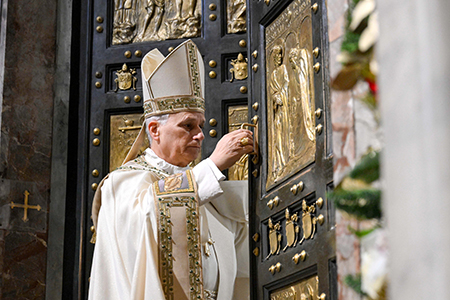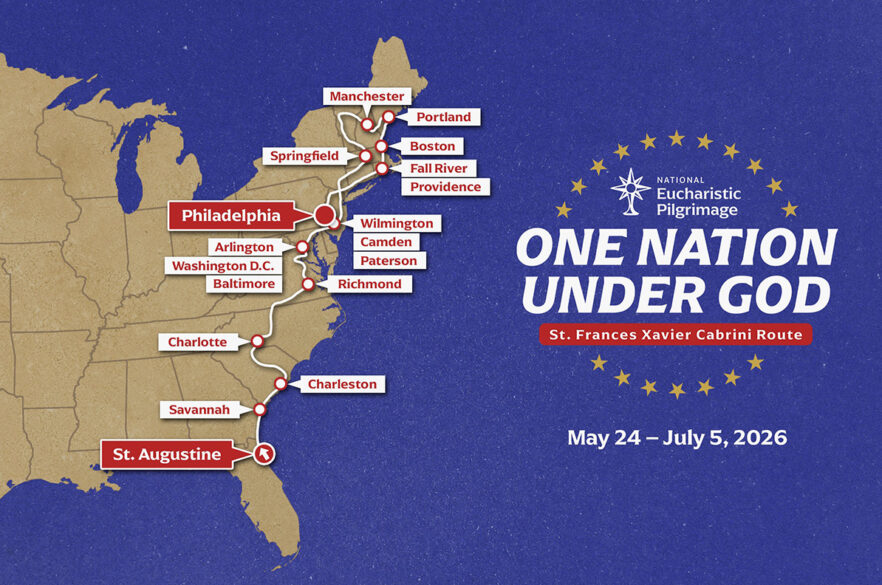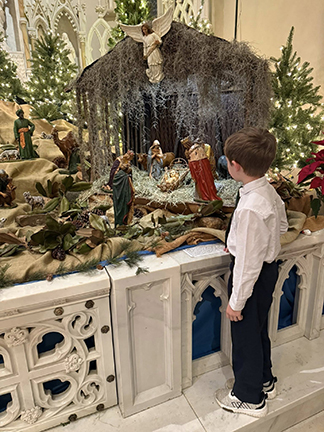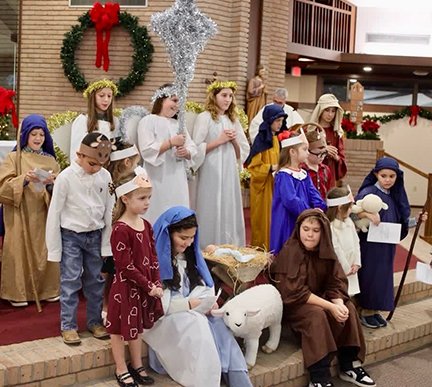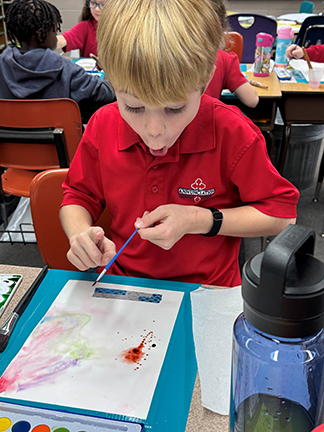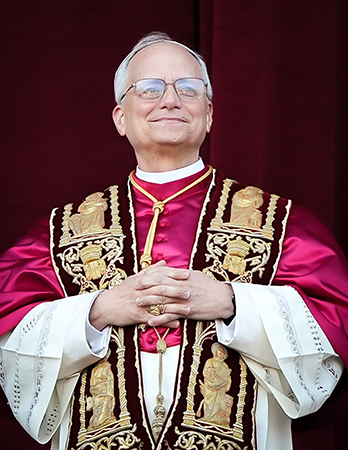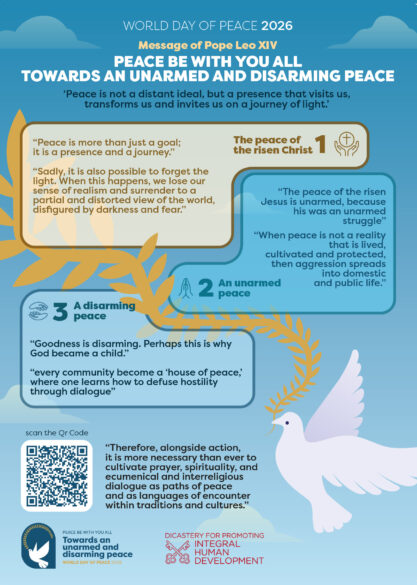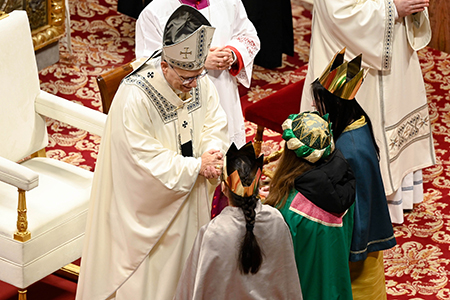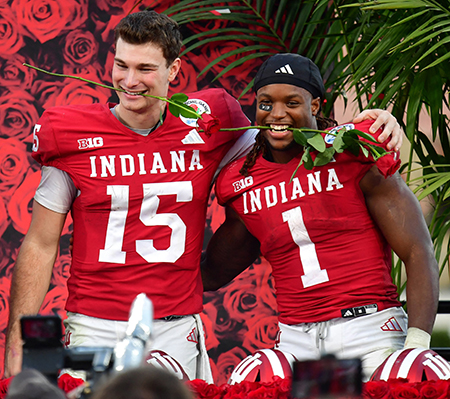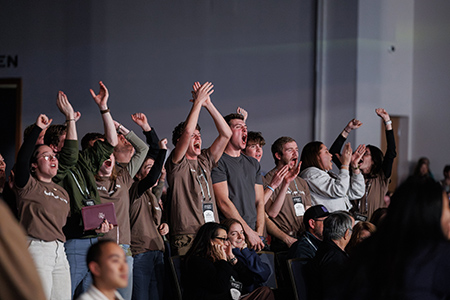By Joe Ruff / The Catholic Spirit
ST. PAUL, Minn. (OSV News) — A bishop’s golden crosier, or hooked staff symbolizing his office, found in a Minnesota scrapyard has drawn the man who discovered it into a journey back to the Catholic Church of his youth.
“If I’m the lost sheep, it literally took a shepherd’s staff put right in my path” to seriously pursue the faith, Jeff Helgeson, 62, of New Richmond, Wisconsin, told The Catholic Spirit, the newspaper for the Archdiocese of St. Paul and Minneapolis.
Archbishop Bernard A. Hebda accepted the crosier when Helgeson told him about it May 30 at the Archdiocesan Catholic Center in St. Paul. The archbishop carried the crosier at the closing Mass June 7 of the Archdiocesan Synod Assembly 2025 at the Cathedral of St. Paul, and he told the story of its being found as part of his homily.
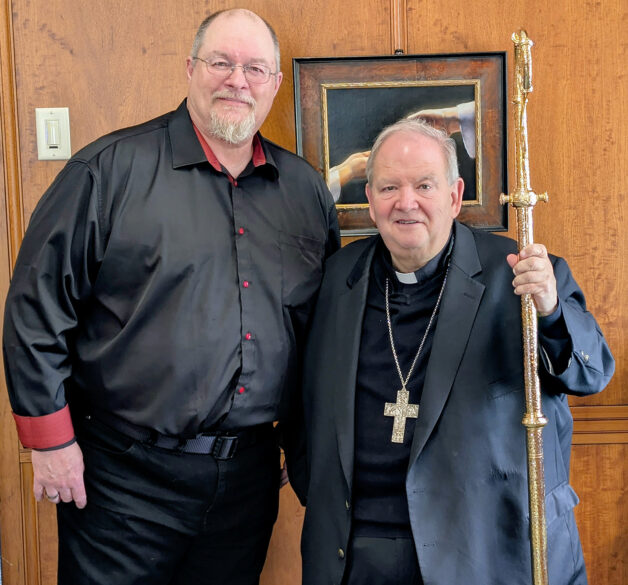
“We don’t know whose crosier it was,” the archbishop said in his homily. “But how magnificent that in the midst of that scrapyard — maybe like that field of dry bones (in the biblical story found in Ezekiel) that there was that sign of hope, that glimmer of hope, that we can celebrate this evening.”
“We hope, my brothers and sisters, that we might be like that gentleman who found this crosier in the scrapyard,” the archbishop said. “That we might be able to recognize the treasure that God has in our midst.”
Asked recently to tell his story, Helgeson — who routinely drives scrap metal to St. Paul from the electric motor manufacturer he works for in Woodville, Wisconsin — said he found the crosier while dropping a load off in March and following his usual routine of looking around the yard.
“There’s quite a menagerie of scrap metal,” he said. “You’d be surprised at what people throw out. So, I was walking around and that’s when I spotted the crosier sticking out.”
The bright gold staff with its hook holding an ornately fashioned cross protruded from the flatter color of brass items that surrounded it, Helgeson said.
It also appeared to be something that should go back to the church, he said, as it reminded him of the crosier he saw while serving at Masses as a Catholic school youth in Fargo, North Dakota, when the late Bishop Justin A. Driscoll (1920-1984) presided.
“As soon as I saw it, I said, ‘This doesn’t belong here,'” Helgeson said. “There’s no way this was scrap metal.”
Helgeson asked workers in the yard if he could purchase the crosier, and they promised to ask their manager. About a month later, the manager was in the scrapyard and gave him the crosier free of charge, Helgeson said.
“He said, ‘Do the right thing,'” Helgeson said. “He said, ‘We’re not taking a thing for it.’ Businesses don’t usually do that. And I would have paid whatever they asked.”
Intent on finding the rightful owner, Helgeson scoured the internet for similarly fashioned crosiers and finally found one in the Diocese of Springfield, Illinois. Officials in that diocese weren’t aware of similar crosiers and suggested that Helgeson call closer to home, where the crosier was found: the Archdiocese of St. Paul and Minneapolis.
That’s when Helgeson spoke with Paul Iovino, director of the archdiocese’s Office of Ministerial Standards and Safe Environment, who checked with law enforcement agencies and could find no reports of the crosier having been stolen. Helgeson said he asked Iovino if the archdiocese might take the crosier. Iovino said he was glad to receive the offer, and Archbishop Hebda was interested in talking about that.
Meanwhile, Helgeson said his interest in the church and a desire for a deeper spiritual life had been renewed as he read about Pope Francis, who died April 21, and Pope Leo XIV, who was elected May 8. Finding the crosier seemed like another invitation to go deeper in his faith, Helgeson said. Meeting with Archbishop Hebda on May 30 was still another invitation, he said.
“It couldn’t have been a better meeting,” Helgeson said. “I think I was slotted to have like, 15 or 20 minutes with him. But he made it feel like I could be there all day if I wanted to be.”
First, the archbishop asked about him, Helgeson said, “before we even got to the crosier. You can tell when someone really is listening. The archbishop listened.”

Helgeson said he explained that he had been away from the church for 40 years — but he knew what the crosier was when he saw it, and that it had to be returned to the church.
“I handed it to him,” Helgeson said of the crosier. “I was very relieved to do that.”
At the end of the conversation, the archbishop told him, “You can always come back” to the church, Helgeson said. “That, like a lightning bolt, hit me right then.”
Helgeson said he had disengaged from the church after a case of clergy sexual abuse that involved a friend who later committed suicide. “Anger kept me away, and eventually my pride and shame kept me away,” he said.
Helgeson served in the Army from 1982 to 1993, then worked for a railroad company and now is a partially retired truck driver who does long and short hauls for the electric motor manufacturer. Married with two children, he never lost his desire to be close to God.
“I’ve always had a certain spirituality,” Helgeson said, and finding the crosier “has kind of opened up a way back.”
The journey has continued with reading aloud to himself from a Bible he purchased, Helgeson said, to better comprehend it. He reads in the evenings after a long drive for work “or just kind of whenever the mood hits me,” Helgeson said.
In August, he returned to weekly Mass, but did not then receive Communion because he had yet to go to confession, Helgeson said.
“Sometimes you don’t know how hungry you are until you’ve had a little something to eat,” Helgeson said. “I really miss the church.”
At the archdiocese’s Dec. 28 celebration marking the close of the Jubilee Year of Hope, Archbishop Hebda told Catholics gathered at the Cathedral of St. Paul that the promise of the 2025 Jubilee of Hope did not disappoint, as the church focused on mercy and conversion.
He pointed to the crosier Helgeson recovered, and which he held, newly refurbished, calling it “an icon for all of us … of what it is that we hope to experience in the Jubilee Year, in that we find we have this opportunity to experience the treasures of the Catholic Church, and we’re given that opportunity for renewal.”
He said, “The hope, brothers and sisters, is that throughout this year we’ve had the opportunity to really engage in conversion, to come before the Lord, to recognize our sinfulness, to recognize our neediness, and to seek the Lord’s extraordinary mercy.”
(Joe Ruff is editor in chief of The Catholic Spirit, the newspaper serving the Archdiocese of St. Paul and Minneapolis. This story first ran in The Catholic Spirit and is distributed in partnership with OSV News with additional reporting from OSV News senior writer Maria Wiering.)

